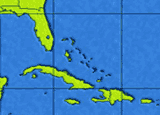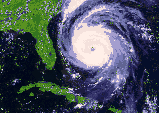Back to Florida Hurricane Main Page
When a hurricane has left an area devastated, there are a number
of health hazards to watch out for. Accidents are just waiting to happen, from
electrocution by downed power lines, to broken glass, exposed nails, chainsaw accidents
and other mishaps related to digging out and cleaning up. Not only that but illness lurks
in the form of water contamination, and food spoilage. Illness also occurs because of
toilets that don't flush and, garbage that piles up.
Food and Water
Food spoilage and water contamination are two of the biggest concerns. You can guard
against food spoilage by using only dry or canned food. Milk, chicken, hamburger, fish and
pork will spoil rapidly and should be discarded if they've been without refrigeration for
more than a couple of hours. This is not the time to trust your sense of smell. When in
doubt, throw it out.
Until the danger of contamination has passed, don't drink or prepare any food with tap
water that hasn't been boiled. Don't let your pets drink tap water either. They are no
more immune than you are and in some cases they are at great risk. As for brushing teeth,
you'll need disinfected water. Don't wash your dishes with tap water unless you are
prepared to rinse them in extra-chlorinated water (15 drops of chlorine bleach to the
quart should do the trick.) Contact lens wearers should use disinfected water to clean
their hands before handling them. Washing them with tap water will lead to eye infection.
Sewage
The frequent flushing of toilets in some cases may be impossible or ill advised because it
can overload already weakened sewer systems. So you may need to find or make a portable
toilet until you get the "all clear" sign. In any kind of urban setting, human
waste left outside, even in treated latrines, contain bacteria that can taint water
supplies and pose health risks. One of the age-old ways to most effectively avoid the
spread of disease is one of the most critical after a hurricane, washing your hands after
using the toilet or before handling food. Diarrhea is nothing to be taken lightly in the
aftermath of a hurricane. Children are especially at risk of dehydration when diarrhea
strikes. If it does, seek medical advice at once.
Drowning
Although hurricane winds can cause an enormous amount of damage, wind is not the biggest
killer in such a storm. Nine out of every ten hurricane related fatalities are drowning
associated with swiftly moving waters. People who enter moving water with their cars, or
who get on boats on lakes or bays when a hurricane strikes the area are at grave risk of
drowning, regardless of their ability to swim. Even very shallow water that is moving
swiftly can be deadly. Cars or other vehicles do not provide adequate protection. Never
enter moving water of any kind with your vehicle. Cars can be swept away or may break down
in moving water. Be alert and follow hazard warnings on roadways or those broadcast by the
media. Police and public works departments should be contacted for up to date information
regarding safe roadways.
Garbage and Trash
Garbage and trash pick-up, like everything else, will probably be slow immediately after a
bad storm. Health care officials suggest double-bagging all garbage in plastic bags, and
keeping the bags in covered containers if at all possible rather than letting it pile up
on the roadside. After a hurricane, be alert for rats and other rodents. They are often
driven from their habitats by higher water and a garbage pile is like a rat super market.
Heatstroke
The rain and wind of a hurricane may be followed by days of hot and humid weather. It can
be an almost unbearable adversary if you do not take some steps to try and keep yourself
cool. Protect yourself from heat exhaustion and heatstroke, here's what you can do to stay
cool while rebuilding under the blazing sun. Wear loose, light colored clothing and a hat.
Dampen yourself and your clothes as the water evaporates, your skin will cool. Drink
plenty of liquids and eat smaller, lighter meals.
Avoid alcoholic drinks. They will raise your body temperature and tend to dehydrate you.
Always wear a strong sunscreen.
Pets and Animals
Wild or stray domestic animals can pose a danger during or after the passage of a
hurricane. Remember most animals are disoriented and displaced as well. Do not corner an
animal. If an animal must be removed, contact your local animal control authorities. If
any animal bites you, seek immediate medical attention. If a snake bites you, first try to
accurately identify the type of snake so that, if poisonous, the correct anti-venom can be
administered. Do not cut the wound or attempt to suck the venom out. Certain animals may
carry rabies. Although the virus is rare, care should be taken to avoid contact with stray
animals and rodents. Health departments can provide information on the types of animals
that carry rabies in your area. Rats may also be a problem during and after a hurricane.
Take care to secure all food supplies, also remove any animal carcasses in the vicinity by
contacting your local animal control authorities.
Chemical Hazards
Be aware of potential chemical hazards you may encounter in the aftermath of a storm,
especially if the hurricane is accompanied by flooding. Floodwaters and high winds may
have moved or buried hazardous chemical containers of solvents or other industrial
chemicals. Contact your local fire department about inspecting and removing hazardous
chemical containers. Avoid inhaling any chemical vapors. Never "sniff" any
container to see if you can identify the contents, one sniff of some chemicals and kill
you grave yard dead. If any propane tanks (whether 20-lb. tanks from a gas grill or
household propane tanks) are discovered, do not attempt to move them yourself. These
represent a very real danger of fire or explosion, and if any are found, the fire
department, police, or your State Fire Marshal's office should be contacted immediately.
Car batteries contain sulfuric acid, which is very caustic. Removal of automotive
batteries from your property can be accomplished safely, but they should be removed with
extreme caution. It is best to use "chemical" gloves and other safety equipment.
Avoid coming in contact with any acid that may have spilled from a damaged car battery.
Use baking soda to neutralize any acid spillage. |



